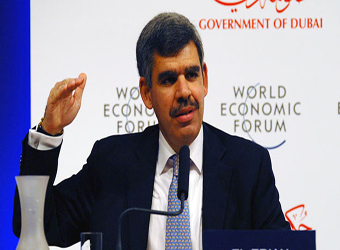It is hard, if not impossible, to hear or read anything optimistic about Egypt these days. Unrest on the streets continues, with an uncomfortably high threat of renewed confrontation involving some combination of the supporters of Mohamed Morsi, the ousted president’s opponents and the military. The political class struggles to coalesce around immediate transitional measures to run the government, let alone those needed to restore the country on the road to A durable democracy. And the economy is in free fall as poverty spreads, shortages grow, inflation rises, unemployment increases and incomes collapse.
There is no denying. Today’s Egypt lacks any robust economic, financial, institutional and political anchors. Even its social anchors are under unprecedented pressure.
No wonder a growing number of people fear what was previously an unthinkable – namely, a civil war in the most populous and influential country in a traditionally-volatile region.
Yet, as much as the current pessimism is warranted by realities on the ground, it should not blind us from five factors that will drive Egypt’s eventual recovery. Moreover, they speak to a large potential that was repressed for decades by a system that was co-opted to benefit the privileged few rather than serve and empower the nation as a whole.
First, Egypt has several economic growth, income and employment engines that can be easily restarted once calm is restored. Be it tourism or manufacturing, agriculture, industry or regional finance, socio-political instability has subjected a consequential part of the economy to a detrimental pause. Yet unlike some European economies, including Cyprus and Greece, these growth engines remain completely viable and powerful; and many of them have beneficial income distributional effects.
Second, the country’s internal finances, while messy, are not beyond repair. The soaring budget deficit reflects both a reversible decline in revenues and compositional spending patterns that can (and should) be reformed. Most importantly, the better targeting of subsidies – away from rich households and companies that do not need them and towards the more vulnerable segments of the population – can achieve both efficiency and equity objectives.
Third, Egypt can alleviate immediate foreign reserve and currency pressures through emergency financing on highly attractive terms. Just witness the recent multibillion-dollar commitments from Kuwait, Saudi Arabia and the United Arab Emirates. They speak to the willingness to support an historical transition that is viewed critical not just to 85m Egyptians but also to the region as a whole. And they come at a time when high international oil prices are bolstering the revenues of Egypt’s friends and allies in the Gulf.
Fourth, for too many years, Egypt has been undermined by avoidable economic governance mishaps and excessive political overreach. Helped by the freedom of expression won by the January 2011 uprising and reinforced by the recent repeat performance aimed at resetting the revolution, national awareness of the country’s “own goals” is widespread. Moreover, judging from recent words and actions, various political actors and the military seem to be learning from past mistakes and are implementing course corrections, albeit partial and tentative at first.
Fifth, an empowered and engaged Egyptian youth is doing more than just influencing the destiny of the country; the greater sense of ownership and belonging is changing facts at the micro level.
The youth movements’ energy, commitment, organisational capacities and effectiveness played a critical role in successfully mobilising millions of citizens in peaceful street demonstrations. They are also powering multiplying civic efforts, particularly those aimed at improving education and health services for those ill-served by the government’s overwhelmed provision of social services and its porous safety net. It is only a matter of time until the underlying entrepreneurship reaches a critical mass that delivers both microeconomic and macroeconomic benefits.
These are all valuable attributes. They can help limit the country’s downside; and they will eventually deliver important medium-term dividends for Egypt as the political process gets its act together. Think of them as rays of light for the current pessimistic darkness that dominates virtually all analysis of Egypt’s current situation and its future outlook. Indeed, they can be more than a partial counter to the growing sense of despair and disappointment that can easily paralyse national and international efforts required to place Egypt on the path of medium-term prosperity. They could also serve as an incentivising signal to key decision makers: the potential upside of sensible economic and political decisions is much greater than many, if not most, deem likely.
About the Writer:
Dr. El-Erian is CEO and co-CIO of PIMCO and is based in the Newport Beach office. He re-joined PIMCO at the end of 2007 after serving for two years as president and CEO of Harvard Management Company, the entity that manages Harvard’s endowment and related accounts.
Dr. El-Erian has served on several boards and committees, including the U.S. Treasury Borrowing Advisory Committee, the International Center for Research on Women, the Peterson Institute for International Economics and the IMF’s Committee of Eminent Persons. He is currently a board member of the NBER, the Carnegie Endowment for International Peace and Cambridge in America. He holds a master’s degree and doctorate in economics from Oxford University and received his undergraduate degree from Cambridge University.
Source: The Financial Times


